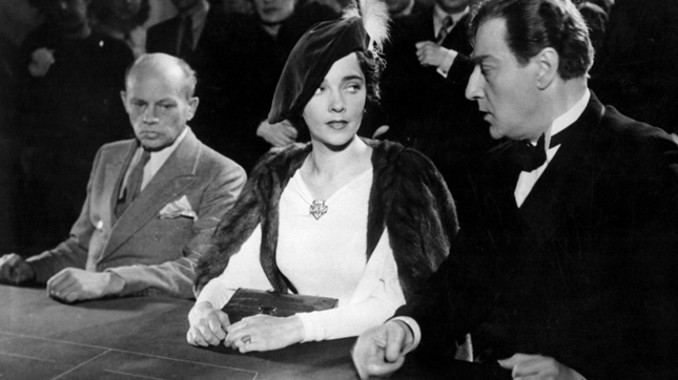Imagine an act in which the magician pulls a rabbit from a hat, followed by a grand piano, the Eiffel Tower and an undiscovered Van Gogh. This is Sacha Guitry’s picaresque The Story of a Cheat.
Guitry plays the eponymous Cheat (we never learn his name) who, well into disreputable middle age, settles down to write his memoirs. Born in a tiny French village into a family of grocers, he commits his first robbery at the age of 12 and has the misfortune to lose 11 relatives in a single day (the two incidents are not unrelated). He leaves home soon after and embarks on an eventful career that includes gambling, conspiracy, romance, theft, the trenches of the First World War and in due course, cheating.
The Story of a Cheat is an audacious, eccentric achievement. Guitry, who not only directed and starred in the film, but also wrote the script—adapted from his novel Les Mémoires d’un tricheur—takes enormous pleasure in defying all expectations of plot, style and tone.
Even the opening titles break with convention. Guitry takes us on a tour behind the scenes of the film we’re about to see, introducing the cast and crew via voiceover. There’s composer Adolphe Borchard at a piano, playing part of his score, Paul Duvergé recording sound from his booth “like a deep-sea diver”, actresses Marguerite Moreno and Jacqueline Delubac pretending to look at something in the distance “but they both know they’re being filmed” and editor Myriam peering at a negative, scissors in hand. Cinema is an illusion, a game we’re invited to play.
Guitry’s playfulness extends to the film’s biggest surprise: except for a few framing scenes, The Story of a Cheat is narrated by the Cheat himself. Other characters appear but when they speak, it’s Guitry’s sonorous, slightly nasal voice we hear. His narration is an arch reminder that he’s spinning a yarn and as his audience we are entirely in his power.
The film is a monologue, with music and pictures. And what a monologue. Guitry first made his name as a prolific actor-playwright and wrote more than a hundred plays over the course of his career. (François Truffaut pays tribute to him in The Last Metro, about a stage company during the Occupation, when one of the actresses considers auditioning for Guitry.) He was the Continental equivalent of Noël Coward and naturally, the Cheat revels in epigrams. Take his philosophy of money: “Money only has value when it leaves our pockets, not when it goes into them.” The miserly should be taxed because “a man who doesn’t spend his income interrupts the rhythm of life by stopping the flow of money.”
Voiceover and image combine to mischievous effect. The Cheat’s family sits down to dinner and the camera glides counterclockwise overhead as he counts all of them in turn, like characters in a fairytale. “A dish of mushrooms,” he informs us, “and overnight I was alone in the world.” Abruptly, everyone but the Cheat vanishes. As his younger self slumps against a wall, the Cheat admits he was “unworthy” of the tragedy, for “How can you mourn 11 people? You just don’t know where to weep.” To lose one parent is a misfortune; to lose both, as well as your grandparents, uncle and six siblings, looks like impudence. Some gags are largely visual. When the Cheat becomes a lift operator at a grand hotel, the length of one of his assignations is measured by the cluster of people in the lobby, impatient for the lift to come back into service.
The film’s unusual construction means most of its performers are excellent mimes. Jacqueline Delubac, Guitry’s wife at the time, appears as Henriette, the Cheat’s wife and pantomimes an entire conversation across a roulette table. Guitry regular Pauline Carton scowls like a disagreeable vulture as the young Cheat’s guardian, Madame Morlot, who makes a habit of lurking behind doors and curtains. Serge Grave and Pierre Assy are equally appealing as the younger incarnations of the Cheat. And Marguerite Moreno brings a gentle wistfulness to one of the Cheat’s old flames. But the film belongs to Guitry himself, who imbues the Cheat with such charm, you would be delighted to suddenly find him at your elbow, even if you suspected he was only there to pick your pocket.
An impeccable display of imagination and wit, The Story of a Cheat is a rare feat: cinema as enchantment.

Leave a Reply